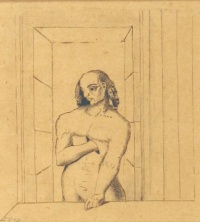Dictum
From The Art and Popular Culture Encyclopedia
(Difference between revisions)
| Revision as of 22:49, 15 December 2013 Jahsonic (Talk | contribs) ← Previous diff |
Revision as of 22:51, 15 December 2013 Jahsonic (Talk | contribs) Next diff → |
||
| Line 1: | Line 1: | ||
| - | [[Image:The Heart Has Its Reasons by Odilon Redon.jpg |thumb|right|200px|''[[The heart has its reasons, of which reason knows nothing|The Heart Has Its Reasons]]'' (c.[[1887]]) by [[Odilon Redon]], a phrase from the ''[[Pensées]]'' ([[1669]]) by [[Blaise Pascal]]]] | + | [[Image:The Heart Has Its Reasons by Odilon Redon.jpg |thumb|right|200px|''[[The heart has its reasons, of which reason knows nothing]]'' (c. 1887) by [[Odilon Redon]], a [[dictum]] from the ''[[Pensées]]'' (1669) by [[Blaise Pascal]]]] |
| {{Template}} | {{Template}} | ||
Revision as of 22:51, 15 December 2013

The heart has its reasons, of which reason knows nothing (c. 1887) by Odilon Redon, a dictum from the Pensées (1669) by Blaise Pascal
|
Related e |
|
Featured: |
A dictum is an authoritative statement; a dogmatic saying; a maxim, an apothegm.
Etymology
From Latin dictum (“proverb, maxim”), from dīcō (say, speak).
See also
Unless indicated otherwise, the text in this article is either based on Wikipedia article "Dictum" or another language Wikipedia page thereof used under the terms of the GNU Free Documentation License; or on research by Jahsonic and friends. See Art and Popular Culture's copyright notice.

